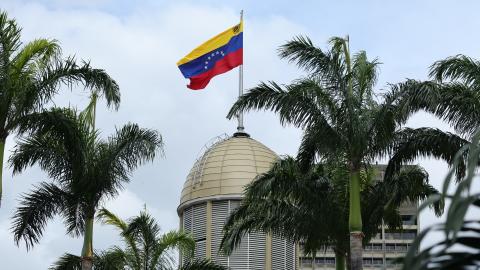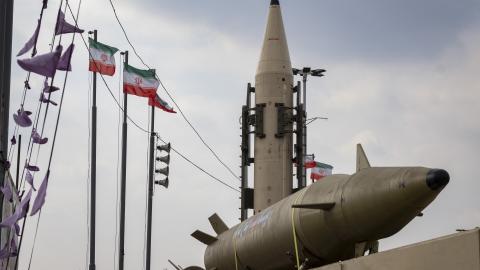Our policy makers anguish over searing new reports about how the United Nations and the Clinton Administration failed the 800,000 victims of the 1994 genocide in Rwanda, and how the international community should have acted to save thousands of Bosnian Muslims massacred in the UN-declared "safe haven" in 1995. Even as they offer their apologies, they fail to recognize or try to stop a religious and ethnic genocide now occurring in Sudan that has destroyed more lives than Bosnia, Kosovo, and Rwanda combined.
Triggered by the government's attempt to forcibly convert and impose Islamic law on the Christian and animist south, a civil war has been raging in Sudan for 16 years. Last June, Congress officially recognized that conflict as genocide. In south and central Sudan, the homeland of the Christians and African traditional believers, two million people had been killed, and five million displaced. More than 100,000 died from the deliberate starvation policies of the regime in 1998 alone.
Sudan should have been an easy human rights case for the Administration. It is already on the U.S. list of terrorist nations and thus subject to comprehensive economic and trade sanctions, and severed diplomatic relations. The White House had launched a cruise missile attack on its capital in 1998. Inexplicably though, the Clinton Administration had been silent about the genocide in Sudan. Its Sudan policy was based on concerns about terrorism, not genocide.
Last year, many churches and human rights groups began to speak out against the genocide in Sudan and document reports of massacres, government-induced starvation, scorched-earth policies and slavery. On June 16, 1999, the U.S. House of Representatives adopted a resolution with only one dissent that had been introduced by Representative Don Payne (D-NJ), condemning the government of Sudan for "deliberately and systematically committing genocide." Five days later, the new U.S. Commission on International Religious Freedom, an independent panel created by Congress, targeted Sudan as an "egregious and ongoing" persecutor of religious believers. A few months later, on October 6, the Administration followed suit and included Sudan in its first designation of "countries of particular concern" for "egregious" religious persecution.
The Commission presented a set of policy recommendations for Sudan in a meeting with President Clinton on October 19. Among the policies, it urged the President to use the bully-pulpit of his office to raise public awareness about them and express American condemnation. It specifically urged him to meet with Nobel laureate and Holocaust survivor Elie Wiesel, who had written him on July 13, stating he was "haunted by what I know of Sudan," calling it a "genocide" and asking for a meeting "to discuss this urgent matter further." (It was to Dr. Wiesel that President Clinton made a public pledge in April 1999: "I will do my best to make sure that something like [the 1994 Rwanda genocide] does not happen again in Africa.")
Actions in the fall offered some encouragement that American policy would change. On November 9, 1999, several hundred leaders of religious and human rights groups convened in the Senate to set a strategy on Sudan. They launched an international divestment campaign against Talisman Energy (a Canadian investor in Khartoum's new pipeline), supported by Secretary of State Madeleine Albright. A large interfaith coalition also petitioned for U.S. action on providing food aid, blocking American investments of foreign companies in Sudan, and other initiatives to stop the genocide. The Senate unanimously passed the Sudan Peace Act in late November 1999.
More recently, however, the Clinton Administration appears to be responding to pressure from forces within the business and non-governmental relief sectors that advocate "engaging" Khartoum, rather than treating it as a pariah. This is a perennial foreign policy question: whether to engage in the hope of reforming or to isolate and weaken a government that violates human rights. In this case of ongoing genocide, international sanctions are a moral and political imperative to force Sudan's government to negotiate peace. Pipeline revenues will insulate this otherwise bankrupt regime and allow it to continue to fuel (quite literally) its genocidal war.
In mid-December, the Administration lifted U.S. trade sanctions against Sudan for gum arabic--America's only import from Sudan--and gave approval to American investments in foreign companies doing business in Sudan, such as a planned, multibillion dollar Wall Street IPO for China Petroleum. By the end of 1999, the Administration had yet to acknowledge that Khartoum is committing genocide. So far it has ignored the millions of deaths, the nearly unanimous Congressional resolution, an appeal from Elie Wiesel, and a petition from two hundred American church and human rights leaders. One shudders to remember the lessons from the summer of 1942 when the State Department bungled Gerhard Riegner's urgent cables warning President Roosevelt about the Holocaust.
The final chapter on American policy toward the Sudanese genocide has yet to be written. Regardless of the importance of international business and trade, the fact that our national leaders continue to be haunted by past genocide underscores the salience of human rights and religious freedom to present-day American foreign policy. The debate on Sudan's genocide will continue and it will, by virtue of new legislation and a mobilized religious community, eventually force a new Sudan policy--one hopefully in time to save lives.














